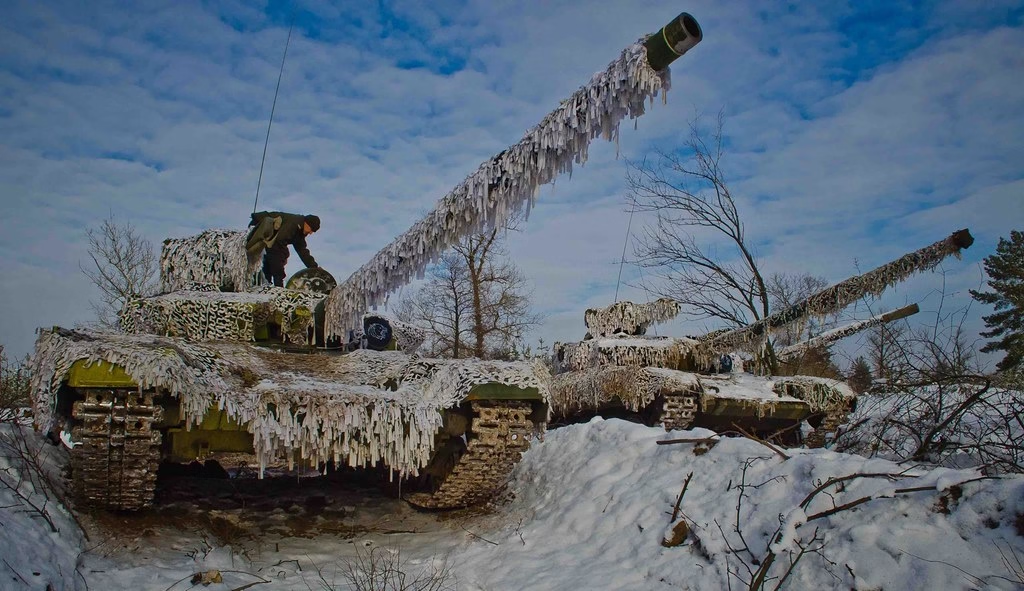Winter war
Autor foto: Domena publiczna

Central and Eastern Europe Weekly Update: The time to act?
28 listopada, 2023


Winter war
Autor foto: Domena publiczna
Central and Eastern Europe Weekly Update: The time to act?
Autor: Author: Sebastian Czub
Opublikowano: 28 listopada, 2023
The onset of winter is beginning to strain both sides of the war in Ukraine, bringing to the battlefield not only the dangers of conventional arms but also those of sickness, supply shortages and the cold itself. Rising to meet these challenges head-on and continue the defence of their homeland, Ukrainians need the stalwart support of the West, which despite pleas for help continues to dwell on its internal issues with divisive questions threatening schisms. It is at times like these that decisive action is needed to ensure regional security and stability.
The War in Ukraine
As November is coming to a close and winter begins, the situation on the frontlines of Ukraine continues to deteriorate. Extensive rains, coupled with the first snowfalls and the changes in temperature, have transformed the Ukrainian battlefields into seas of freezing mud. This brings about the previously anticipated problems with the logistic capabilities of both sides of the war, also limiting their manoeuvrability. However, vehicles stuck in deep mud and country roads turned into quagmires are only the first issues faced by the soldiers in the trenches. The frontline troops covered positions, and the safety provided has now turned against them. Trenches are being flooded with freezing water and mud, with soldiers fighting to maintain their structural integrity so that they can continue providing cover against enemy fire. Working, living and fighting in such conditions, however, puts the soldiers at high risk of hypothermia, trenchfoot, and other illnesses caused by adverse environmental conditions. Coincidently, the situation of soldiers in the trenches will be made even worse by the previously mentioned logistical problems, as lack of supplies, especially food, medicine, and resources for keeping warm, will further increase casualties resulting from non-combat. This, combined with the continued battles in Avdiivka and Bakhmut, will most likely lead to significant casualties among the foot troops, and put an especially heavy burden on the medical corps of both sides.
Such a critical situation of the medical forces has been accompanied for Ukraine with a sacking of the previous head of the Ukrainian medical forces, Major General Tetiana Ostachenko by Zelensky. Ostachenko’s dismissal has come as a result of major criticism and worsening capabilities of Ukrainian medics, who received less training and subpar equipment. Ostachenko has been replaced by Major General Anatoly Kazmirchuk. However, his appointment was met with mixed responses. The changes in the medical forces are, however, only a part of the new endeavours of the Ukrainian armed forces. As stated by Minister of Defence Umerov, one of the priorities now is better medical equipment, better training, digitisation, and better communication according to NATO standards. Training of new forces has been one of the key issues for Ukraine, as the country does not possess enough resources to train a sufficient number of troops. Such issues could result not only in a lack of manpower but potentially even in insufficiently trained soldiers. While the West has been conducting training programmes for Ukrainian troops, especially those who operate Western equipment, these have proven insufficient. The first problem is scale.
Simply put, not enough troops are trained abroad in the West. For example, Operation Interflex, the most ambitious foreign training programme led by the UK with trainers from nine countries, has trained only 23,000 soldiers since July 2022. Most recruits only receive 5-week-long basic training, with longer courses reserved for specialist soldiers and leadership roles. Some Western courses have also received criticism as being detached from the realities of Ukrainian battlefields – such as drones or trench fighting.
EU vote and the effect on CEE
Last week, the European Parliament voted in favour of the report of the Committee on Constitutional Affairs, which recommends changing the Union treaties, focusing on 65 key areas and the transfer of competencies from the member state level to the EU relating to environmental protection and biodiversity, as well as enlargement of EU in the areas of foreign policy and security, border protection, public health, civil defence, industry, and education. The report proposes a change from the unanimity principle into a qualified majority voting rule, effectively meaning an end to member states veto powers. This change aims to avoid situations in which a single state could block critical decisions regarding the entirety of the Union, a problem quite evident since the Russian 2022 invasion of Ukraine and a tendency of certain EU member states to block critical decision-making processes. However, it is worth mentioning that the support of such changes by the European Parliament does not mean their implementation. The final decision to accept and implement these changes lies with the unanimous agreement of all heads of state of EU member states.
While the transition to majority voting instead of the unanimity principle could lead to greater cohesion of EU foreign policy, especially in times of crisis, it could, according to some, also endanger the principles of democracy and equality. The Polish government has greatly criticised the outcome of the vote and the proposed changes to EU treaties. Polish Prime Minister Mateusz Morawiecki claimed that such a transition would be a threat to Polish sovereignty. While Morawiecki’s commentary was mainly used to inflame the anti-EU rhetoric, it points to some potential issues, maybe better presented by the Lithuanian President Gitanas Nauseda, who stated that such changes could be unfair to smaller and weaker states within the Union. Smaller states, especially those with different worldviews in Central Eastern Europe, could be dominated by Western states with more power in EU institutions. Nauseda argued for the need to create and maintain a level playing field within the EU where all member states could interact and decide on fairgrounds, especially highlighting the need for potential new EU members like Ukraine, who would only be entering the world of the EU institutions.
Poland – truck strikes blocking border
As the war in Ukraine turns into a hellish image of trench warfare and freezing mud, its key ally Poland continues to be locked in its internal struggles. However, the farce and the status quo might soon reach its end, with Prime Minister Mateusz Morawiecki stating that his chosen government will be presented on Monday, November 27. The new government will then have two weeks to present an application to the parliament for a vote of confidence for the new government. However, as Morawiecki’s political party and its allies do not have the majority in the parliament, the vote will not pass, meaning that a new prime minister will be chosen by the parliament, which will most probably select opposition leader Donald Tusk. This new government, composed of the liberal-progressive opposition parties (Civic Coalition, Third Way, and the Left), will only be able to create the new government and jumpstart Polish political activity already after the new year.
While the political change in Poland might be imminent, its continuous delay and lack of effective action, especially regarding the war in Ukraine, is heavily problematic. While the difficulties posed by the Polish status quo have already been discussed in previous weeks’ analysis, a key issue has resurfaced. This week a strike action has targeted the Polish-Ukrainian border, with protesters blockading the passage of transport vehicles (lorries) between the two countries. The blockade of the Polish-Ukraine border has reduced traffic threefold. The strike has had a significant impact on Ukraine, which, since the blockade of its ports by Russian warships, has largely relied on the land routes to and through Poland. Most military supplies, equipment, and civilian commodities have been transported across the Polish border via railway or road-based transport. The crippling of these avenues at a critical time in the war could have significant consequences for Ukraine, already struggling to maintain its troops due to an adverse environment. The situation requires immediate attention. Otherwise, it risks crippling the Ukrainian war effort. However, the Polish political arena is at a standstill, and the lack of political will to resolve the issue by the acting officials from the Law and Justice party has only inflamed the issue. The situation is being made even worse by the fact that representatives of the Confederation party, who previously showed anti-Ukrainian sentiments, have supported the strike. Should this issue not be resolved quickly and effectively, the already strained relations between Poland and Ukraine might be crippled, with the only beneficiary of such an ending being Russia and its imperialistic ambitions.
Conclusion
With the coming of winter, harsh weather, and mud, the battlefields of Ukraine bring new threats and challenges. The soldiers are beset not only by conventional military threats but also by the environment and sickness, which, coupled with logistical problems, will most probably result in heavy casualties. At this time, Western support is much needed, not only to help supply Ukrainian troops with the equipment and supplies necessary to survive such hellish conditions but also to train new troops to replace those lost to either sickness or battle. It is in these conditions that exactly the opposite is happening. Instead of increasing aid, a noose has been tied to one of the main supply arteries to Ukraine from Poland. Should it remain in place this noose could very much strangle the Ukrainian war effort and finish the job for the Russians. And while vital Ukraine is, unfortunately, not the primary focus of countries in Central and Eastern Europe, which looks primarily at its internal struggles as well as a potential schism in EU relations resulting from the proposed abandonment of the principle of unanimity. It is at times like these that regional leaders should take responsibility and find a way through the storm. Could Poland, with a new progressive-liberal government, shoulder such a burden only remains to be seen, though one thing remains crystal clear: the time to act is now.
Author: Sebastian Czub, Analyst, Casimir Pulaski Foundation





